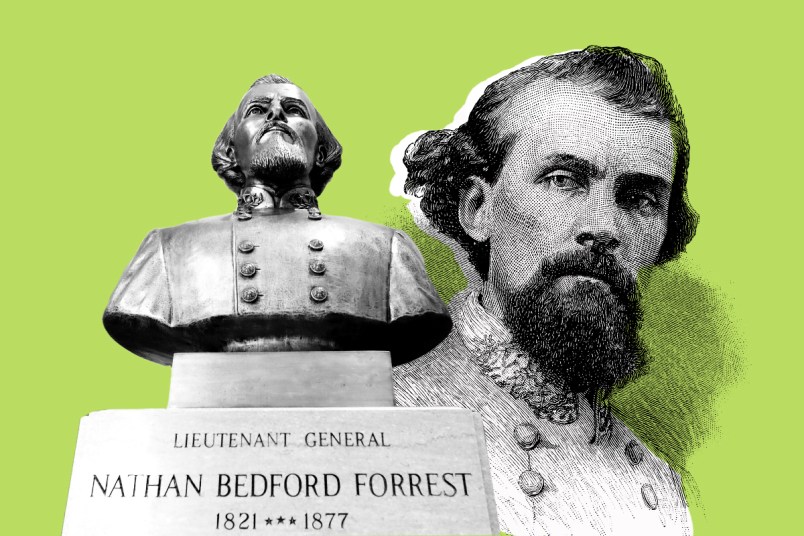Sheryl Guinn, president of the Nashville chapter of the NAACP, grew up in the city and has long been surrounded by symbols of the Confederacy. So she’s quite familiar with Nathan Bedford Forrest, the Tennessean slave trader, Confederate general and early Ku Klux Klan leader who’s been honored with a bust in the state capitol for the past 43 years.
“We’ve always known that he existed, and we’ve always known how horrible of a person he was,” Guinn told TPM. “They have never, never wanted us to forget that we were always property, and we were always beneath them, and that’s what that bust represents.”
For a moment earlier this month, it seemed the bust was on its way out of the Capitol: The Tennessee Historical Commission voted 25-1 for its removal, an unprecedented step in the long legal process required for moving monuments in the state.
Then, several Republicans in the legislature introduced a bill that would sack and replace the members of the commission. And the state’s lieutenant governor and House speaker have also raised concerns that the commission, in fact, didn’t follow the legal process for approving the bust’s removal. Once again, conservatives are coming to the aid of the state’s most prominent Confederate.
“We’re dealing with people who, even when they make the rules and lose at their own game, then they just flip over the board and say ‘Okay, we lost, and we’re still in control, we’re still in power, so we’re going to change the rules again,” said Justin Jones, a leader among activists who protested Forrest’s presence in the Capitol.
For opponents of the bust, the fight on Forrest’s behalf is a symptom of the Republican domination in the state: Both legislative chambers are overwhelmingly Republican and have long legislated roadblocks meant to protect symbols of the Confederacy.
“This is part of the ALEC real estate area,” Sen. Heidi Campbell (D) told TPM, referring to the American Legislative Exchange Council, a conservative lobbying group that wields enormous influence among state-level Republican lawmakers.
Campbell referenced proposals that passed the Senate this month, including anti-transgender legislation and a bill allowing the permitless carry of firearms.
“This is where Republican bills go to win,” the senator said.
An attorney for Forrest’s descendants, Edward Phillips, articulated a common argument to TPM: The bust should stay in the Capitol in order to spur discussion on the state’s history. He imagined an African American father speaking to his children.
“‘See that bust up there?'” his imagined conversation goes. “‘Some people think this man was a great hero. Well, he was a brilliant military leader, but here, let me tell what I think is wrong with this man, why I think he was flawed — like we’re all flawed, but his flaws were pretty darn great. Let’s talk about his flaws.'”
“I think that’s more powerful than anything else,” Phillips said. “But see, for some reason, we believe that we have to protect everybody from everything.”
But Guinn, the NAACP president, said Tennesseans know plenty about Forrest and the Confederacy: Drivers in the state can still request a Sons of Confederate Veterans license plate, which benefits the organization and features a Confederate flag. After an unsuccessful effort to change its name, Forrest Hall still sits at the center of Middle Tennessee State University.
And traffic on the I-65 in Nashville still passes by a massive fiberglass statue of Forrest on horseback, sculpted by one of the attorneys for Martin Luther King Jr.’s assassin. The statue, known for its distinctive looks, was erected on private property in 1998 and made visible that year when the state cleared vegetation from the highway sightline.
The Department of Transportation later rejected the city’s request to cover the statue up with trees and vegetation — because, the office said in 2015, “TDOT does not plant foliage on its right-of-way with the sole intention of blocking items on private property based on what might be offensive to some and not to others.”
For activists in the state, Forrest’s bust in the Capitol is symbolic of a larger fight against centuries of racism. For now, the bust, and the racism, remain.
“This is the low-hanging fruit,” Jones said. “If we cannot remove such an overt symbol of white supremacy — a Klan leader, a Confederate general, a slave trader, someone who was engaged in terrorism against people of color — then imagine how difficult it is for us to remove the more sophisticated and subtle policies of white supremacy that that statue represents.”
Jones ticked through a list of legislative priorities: Mass incarceration, voter suppression, the denial of health care that disproportionately affects people of color.
“We have to remove the statue — then we have to remove the statutes,” he said.
“This bust is nothing more than a symbol,” Guinn said. “It is a symbol of all of the division that has stood here in the South since the beginning of the South, since there was a South. Since the South existed, that division existed. ”
“That division existed for specific reasons, and our position is, all of those reasons need to die.”



